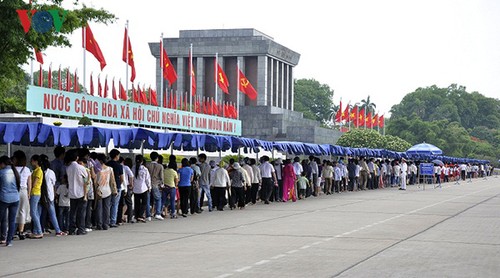 A long queue of people waiting for their turn to visit President Ho Chi Minh’s mausoleum A long queue of people waiting for their turn to visit President Ho Chi Minh’s mausoleum |
The cultural and art exchange program review the challenging but glorious path Vietnamese people have undergone to realize Uncle Ho’s 5 biggest aspirations. They included liberating southern Vietnam for national unification, building a bigger and more beautiful Vietnam, building a strong and pure contingent of Party members, training the revolutionary young generations, and consolidating the international solidarity bloc. The program’s 10 reportages told historical witnesses’ stories about how much solidarity is significant to Vietnam as a key word of the President’s testament.
Dr. Tran Viet Hoan, former director of President Ho Chi Minh Relic Site at the Presidential Palace, said: “In August 1969 the Red River water rose, when Uncle Ho was sick. The Party Central Committee wanted to take him to the safe zone because they feared the river dyke might break. But Uncle Ho said I could not abandon the people, first of all we must take care of the people. After waking up, his first question was did the Red River water recede? Where did the southern people win? He taught the cadres to be close to the people, care for what people care for, and suffer their pain. If the people starve, the Party and the government are to blame for. If the people are sick and hungry, our policies won’t work.”
President Ho Chi Minh’s testament, which he began to write in May 1965 and finished in May 1969, four months before he passed away, is a special historic document. It has become a guideline for Vietnam’s revolution and development during the past half century.